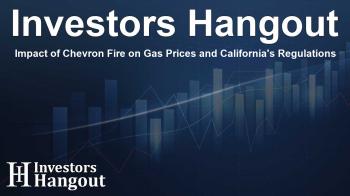Impact of Chevron Fire on Gas Prices and California's Regulations

Crisis at Chevron and Rising Gasoline Prices
Recent events at the Chevron refinery have sparked concerns over gasoline prices in California. A fire at the El Segundo facility is anticipated to trigger significant spikes in fuel costs, alarming consumers and advocacy groups alike. Consumer Watchdog sheds light on this troubling situation, particularly emphasizing the lack of swift action from state officials.
California Energy Commission's Delay
According to Consumer Watchdog, the inaction of Governor Newsom's California Energy Commission (CEC) exacerbates the issue. No timely measures have been enacted for resupply and minimum inventory regulations, which are essential during emergencies like refinery outages. The organization asserts that Californians could find themselves defenseless against price spikes if swift policies aren't implemented.
Consequences for Consumers
In their statement, the group noted that the absence of strict rules forces residents to rely on a handful of refiners who control most of the gasoline supply. Without mandates to replenish fuel stocks or maintain minimum inventory levels, consumers are left vulnerable to market fluctuations.
Government Actions and Inactions
In 2024, the Governor called for a special session aimed at addressing these concerns, yet the CEC has shown signs of hesitation in moving forward with critical regulations. Jamie Court, President of Consumer Watchdog, expressed frustration over the slow progress of the CEC despite an established legal framework intended to protect consumers from price gouging and inflated profits post-disaster.
New Regulations and Their Importance
The law, ABX2-1, was signed in late 2024 to grant the CEC authority over refiners concerning inventory management and resupply plans during disruptions. However, the lack of actionable guidelines raises serious questions about its effectiveness. As evidenced by state research, gasoline prices soar when supply dips below certain thresholds, and without protective regulations in place, the consequences may be severe.
Call for Accountability
Furthermore, the implementation of SBX1-2 in 2023 aimed to introduce price gouging penalties for companies that exploit events for excessive profits. However, the delay in the development of this penalty raises further concerns. Critics argue that without such a penalty, refiners are free to raise prices without fear of repercussions, placing an undue burden on consumers already affected by rising costs.
Learning from the Past
The situation mirrors past experiences where complacency from state regulators left California residents vulnerable. Consumer Watchdog warns that if gas prices soar again following the Chevron fire, it will reflect poorly on Governor Newsom for failing to ensure timely regulations. The organization stresses that complacency can have dire consequences for everyday consumers at the pump.
Future Steps for Better Regulations
As discussions continue around potential regulations, there is an urgent call for the CEC and the Newsom Administration to act decisively. Establishing clear rules for minimum inventories and resupply obligations during refinery crises should be prioritized to protect consumers from future price shocks. The community must advocate for timely enforcement of these regulations to prevent a reoccurrence of this scenario.
Frequently Asked Questions
What triggered the gasoline price spike in California?
A fire at the Chevron refinery in El Segundo is expected to drive up gasoline prices significantly.
What regulations are currently delayed by the California Energy Commission?
Regulations regarding resupply and minimum inventory levels are currently stalled, impacting fuel availability during emergencies.
How might Californians be affected by rising gas prices?
Without protective regulations, consumers could face higher costs at the pump, particularly after refinery outages.
What laws have been enacted to protect consumers in these situations?
The state has instituted ABX2-1 and SBX1-2 to establish minimum inventories and potential penalties for price gouging, but implementation is still pending.
Who is responsible for the regulation of gasoline prices and supply in California?
The California Energy Commission is responsible for developing rules that govern gasoline supply and pricing practices, yet their actions have been slow.
About The Author
Contact Caleb Price privately here. Or send an email with ATTN: Caleb Price as the subject to contact@investorshangout.com.
About Investors Hangout
Investors Hangout is a leading online stock forum for financial discussion and learning, offering a wide range of free tools and resources. It draws in traders of all levels, who exchange market knowledge, investigate trading tactics, and keep an eye on industry developments in real time. Featuring financial articles, stock message boards, quotes, charts, company profiles, and live news updates. Through cooperative learning and a wealth of informational resources, it helps users from novices creating their first portfolios to experts honing their techniques. Join Investors Hangout today: https://investorshangout.com/
The content of this article is based on factual, publicly available information and does not represent legal, financial, or investment advice. Investors Hangout does not offer financial advice, and the author is not a licensed financial advisor. Consult a qualified advisor before making any financial or investment decisions based on this article. This article should not be considered advice to purchase, sell, or hold any securities or other investments. If any of the material provided here is inaccurate, please contact us for corrections.

